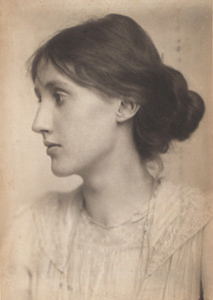
By Virginia Woolf
弗吉尼亚·沃尔夫 ■王碧 译
Most admired for her brilliant stream-of-consciousness novels, Woolf (1882-1941) also worked as a publisher and wrote short stories, criticism, reviews, and volumes of lucid, imaginative essays. A feminist who felt sharply the loss of women's genius because of their prescribed role in society as nurturers of children and male egos, she accounts for the lesser achievements of her sex in A Room of One's Own (1929), from which the following excerpt is taken.
沃尔夫(1882-1941)不仅以其杰出的意识流小说备受世人推崇,同时她还从事出版工作,创作短篇小说,发表评论文章,写了大量晓畅、想象力丰富的散文。作为一名女权主义者,她强烈地感受到,妇女在社会中扮演着抚养孩子和助长男本主义的既定角色,因此才华泯灭。本文选自沃尔夫《自己的房间》一书,她在该书中说明了女性成就小于男性的原因。
It would have been impossible, completely and entirely, for any woman to have written the plays of Shakespeare in the age of Shakespeare. Let me imagine, since facts are so hard to come by, what would have happened had Shakespeare had a wonderfully gifted sister, called Judith, let us say. Shakespeare himself went, very probably—his mother was an heiress—to the grammar school, where he may have learnt Latin—Ovid, Virgil and Horace—and the elements of grammar and logic. He was, it is well known, a wild boy who poached rabbits, perhaps shot a deer, and had, rather sooner than he should have done, to marry a woman in the neighbourhood, who bore him a child rather quicker than was right. That escapade sent him to seek his fortune in London. He had, it seemed, a taste for the theatre; he began by holding horses at the stage door. Very soon he got work in the theatre, became a successful actor, and lived at the hub of the universe, meeting everybody, knowing everybody, practising his art on the boards, exercising his wits in the streets, and even getting access to the palace of the queen. Meanwhile his extraordinarily gifted sister, let us suppose, remained at home. She was as adventurous, as imaginative, as agog to see the world as he was. But she was not sent to school. She had no chance of learning grammar and logic, let alone of reading Horace and Virgil. She picked up a book now and then, one of her brother's perhaps, and read a few pages. But then her parents came in and told her to mend the stockings or mind the stew and not moon about with books and papers. They would have spoken sharply but kindly, for they were substantial people who knew the conditions of life for a woman and loved their daughter—indeed, more likely than not she was the apple of her father's eye. Perhaps she scribbled some pages up in an apple loft on the sly, but was careful to hide them or set fire to them. Soon, however, before she was out of her teens, she was to be betrothed to the son of a neighbouring woolstapler. She cried out that marriage was hateful to her, and for that she was severely beaten by her father. Then he ceased to scold her. He begged her instead not to hurt him, not to shame him in this matter of her marriage. He would give her a chain of beads or a fine petticoat, he said; and there were tears in his eyes. How could she disobey him? How could she break his heart? The force of her own gift alone drove her to it. She made up a small parcel of her belongings, let herself down by a rope one summer's night and took the road to London. She was not seventeen. The birds that sang in the hedge were not more musical than she was. She had the quickest fancy, a gift like her brother's, for the tune of words. Like him, she had a taste for the theatre. She stood at the stage door; she wanted to act, she said. Men laughed in her face. The manager—a fat, loose-lipped man—guffawed. He bellowed something about poodles dancing and women acting—no woman, he said, could possibly be an actress. He hinted—you can imagine what. She could get no training in her craft. Could she even seek her dinner in a tavern or roam the streets at midnight? Yet her genius was for fiction and lusted to feed abundantly upon the lives of men and women and the study of their ways. At last—for she was very young, oddly like Shakespeare the poet in her face, with the same grey eyes and rounded brows—at last Nick Greene the actor-manager took pity on her; she found herself with child by that gentleman and so—who shall measure the heat and violence of the poet's heart when caught and tangled in a woman's body?—killed herself one winter's night and lies buried at some cross-roads where the omnibuses now stop outside the Elephant and Castle.
That, more or less, is how the story would run, I think, if a woman in Shakespeare's day had had Shakespeare's genius.
|
![]() 本网站由北京信息港提供网络支持
本网站由北京信息港提供网络支持